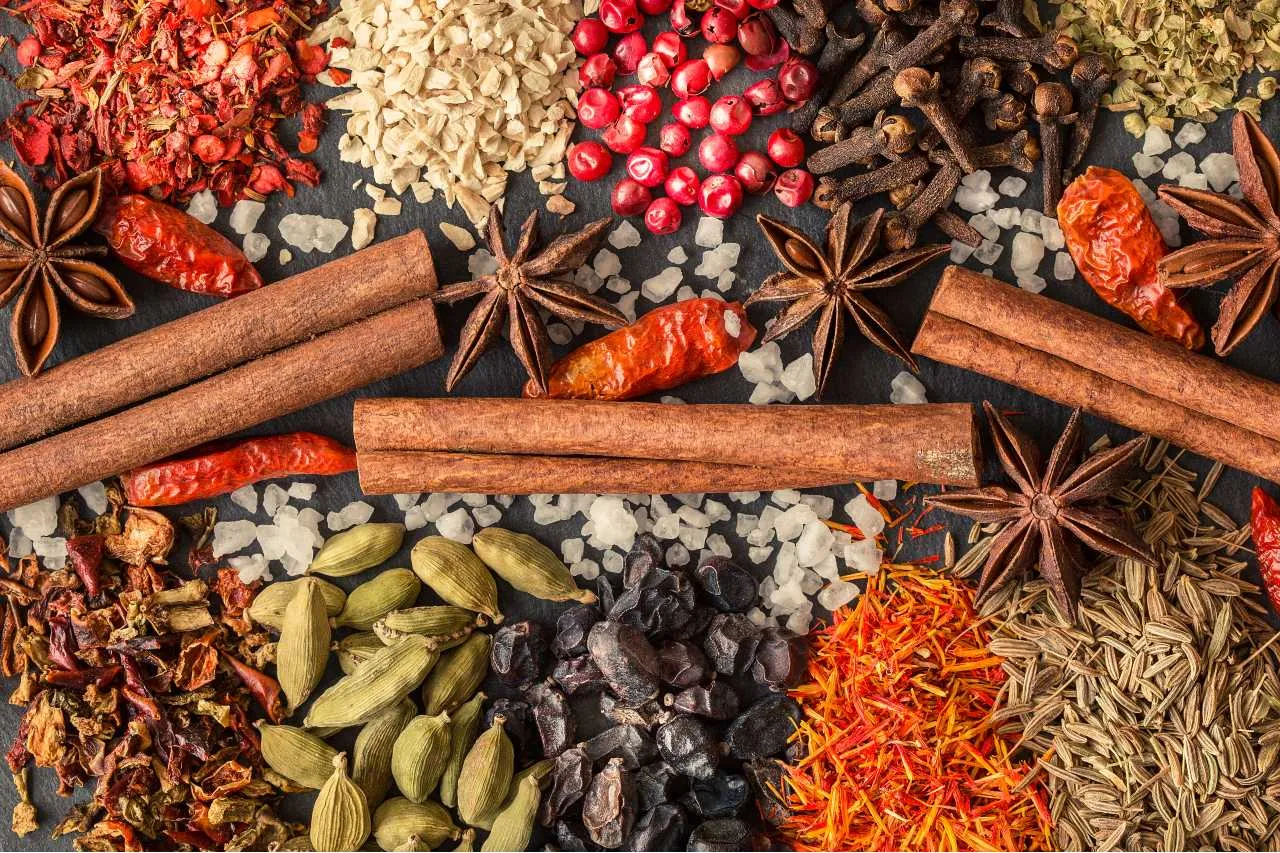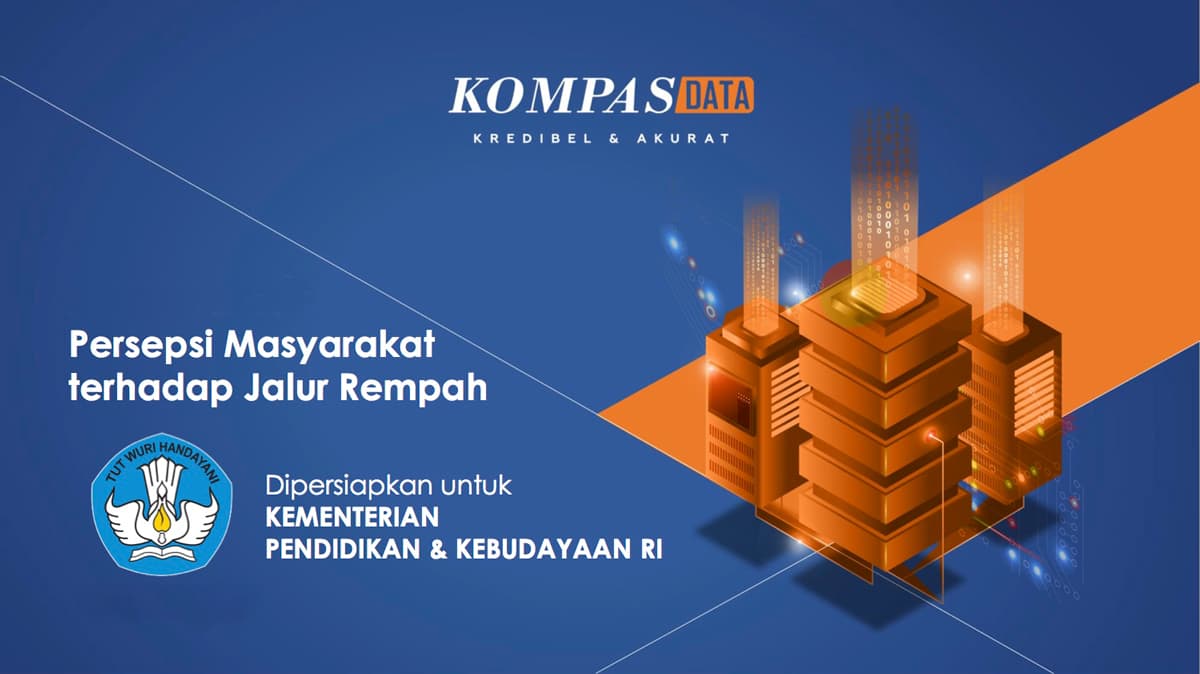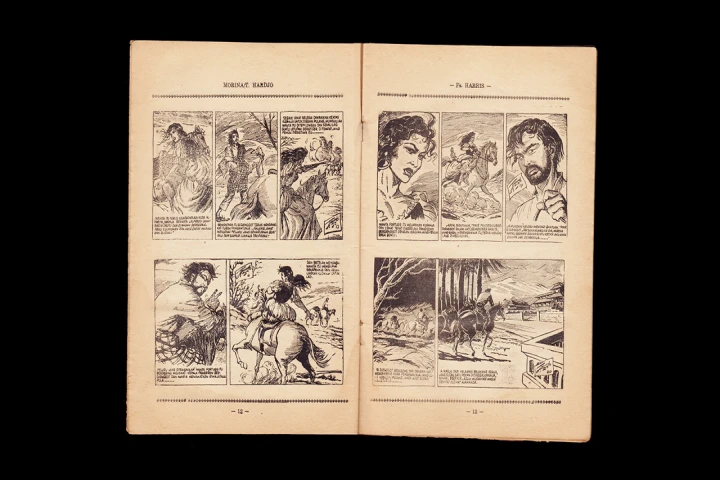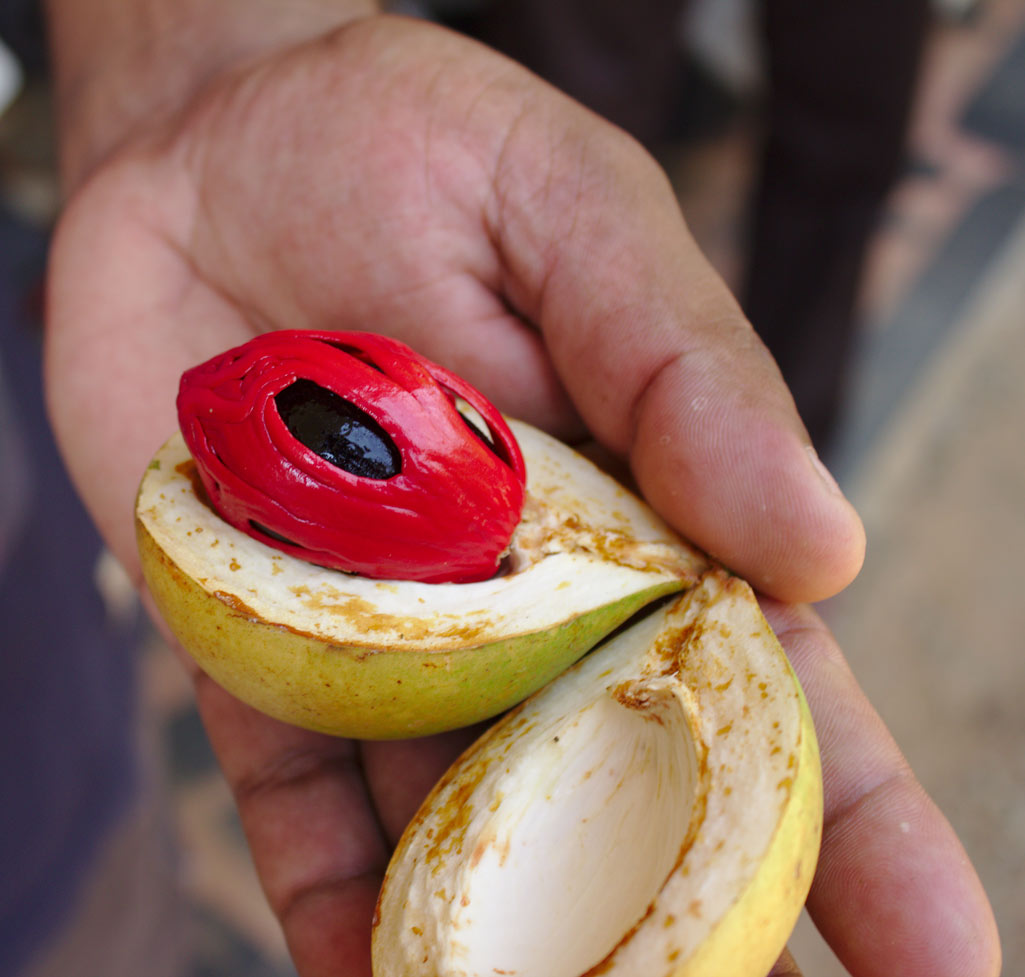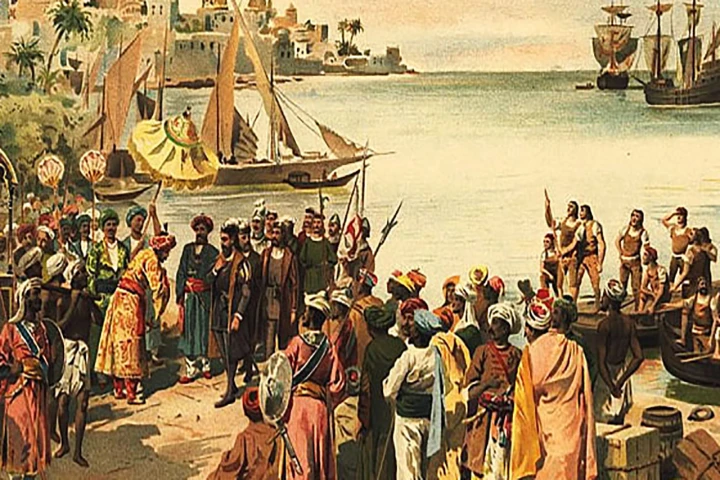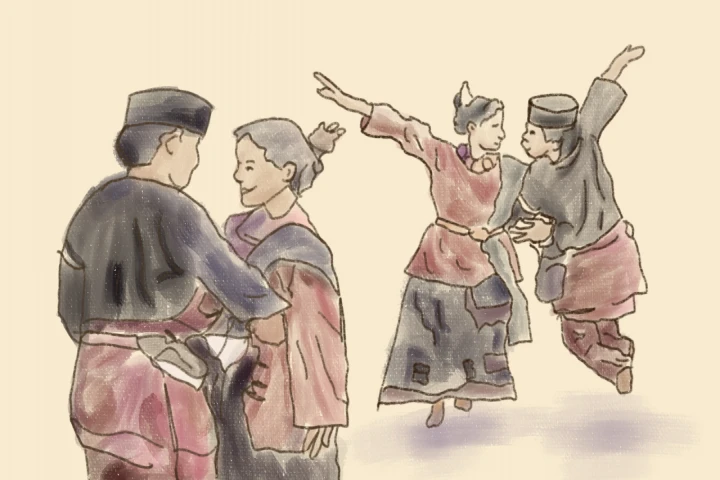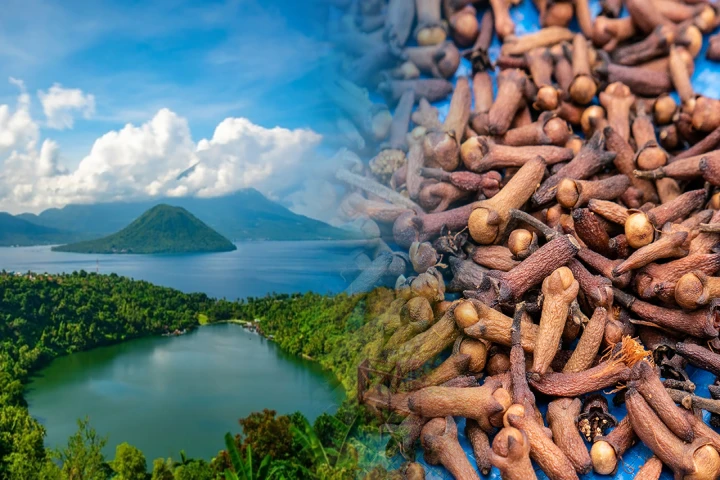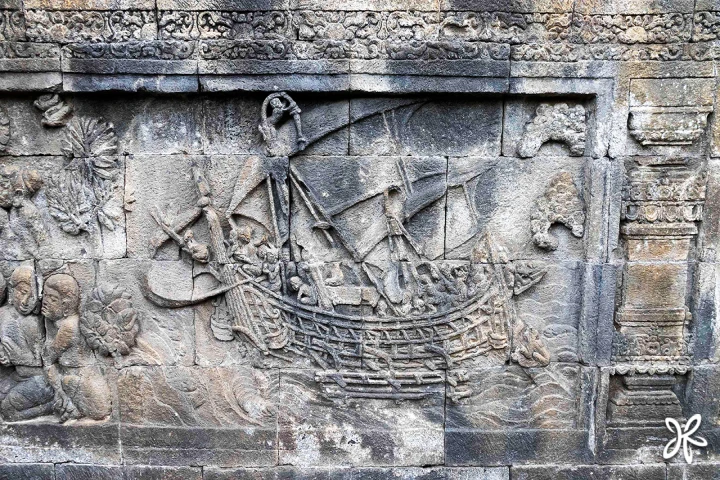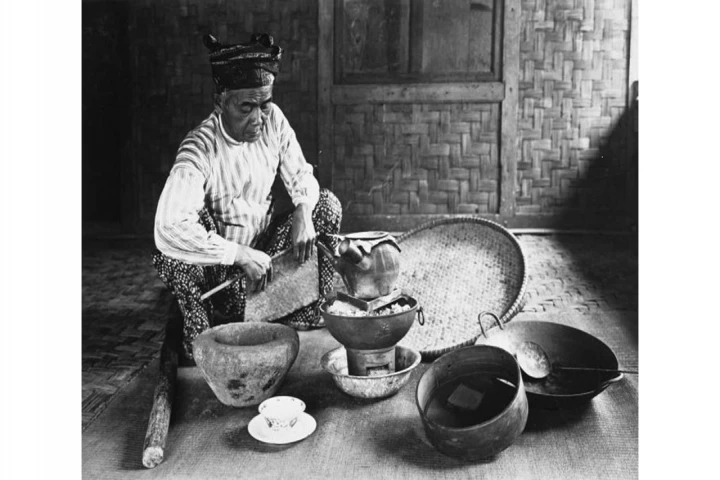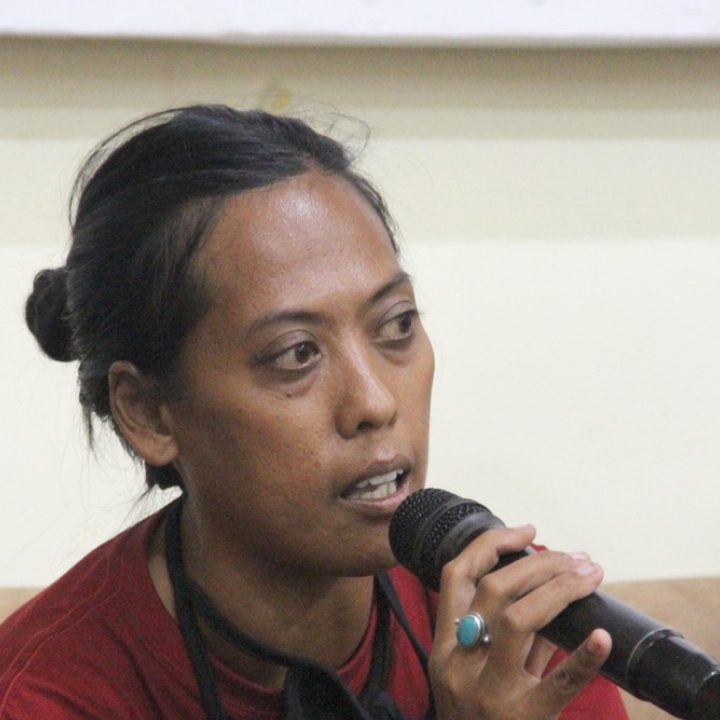
The Covid-19 pandemic forced the majority of people to stop their activities outside their houses. People started to do things inside their homes, the term “work from home” has become familiar to our ears, for keeping a distance and avoiding the crowds become one of the most effective means to prevent us from catching the virus. It did not apply to Nova Ruth and other Arka Kinari crews who were still on their journey to Indonesia.
Arka Kinari—a schooner ship size 18m and has two sails, equipped with a solar panel, owned by two intercontinental musicians Nova Ruth and Grey Filastine—was still floating in the middle of the sea when the pandemic broke out. In the middle of 2019, the ship set off from the Netherlands, sailed across Europe, the Caribbean Sea, through the Pacific Ocean until they reached Indonesian waters, specifically Sorong, Papua, in September 2020. A voyage with a social mission, including renewable energy, marine sustainability, and history exploration by visiting the significant areas of Nusantara Spice Routes.
I came to meet Nova in Makassar, one of the significant knots of Nusantara Spice Routes, on Friday (9/10/20) evening. It was their umpteenth berth, after Sorong, Banda, and Selayar. Makassar was cold at that time, for the rain had just stopped. We sat at the court of Fort Rotterdam, which was once known as Fort Ujung Pandang. Her fifth day in Makassar was the last day or a day before Arka Kinari continued their voyage to Benoa, Bali; the last Spice Routes point that they would visit and took several months to break before continuing their voyage.
Makassar today is not different from Makassar in the old days that was known as the largest seaport of the spice trade in the east part of Nusantara. It is still a bustling city despite the pandemic. In the past, Makassar was filled by many trading companies that set up buildings here, including the Chinese, Malay, and Europeans (Danish, Dutch, English, and Portuguese). Today, the hustle and bustle come from malls, five-star hotels, many entertainment places, and holiday avenues.
“I see Makassar [today] is supposed to be the center of knowledge about Makassar [in the past],” said Nova in the middle of our conversation. I sensed her restlessness, as a Bugis descent, the reflection after visiting various historical sites, and the knowledge she just acquired about how fascinating her native land was in the past. About Makassar, which once had a leader adored by many other leaders in the world, Karaeng Pattingalloang, their awareness to have their own writing system, shipping and trading law they already had, and the architectural wealth caused by international trades.
“The strong history, not to mention its role as the trade area for spices and rice, but most importantly, we learn from the mistakes in the past, and of course for the future…” she added.
In the preface of National Geographic Indonesia magazine “Merapah Rempah” edition, Hilmar Farid wrote, “Romantisme sejarah telah mengukir narasi bahwa rempah-rempah menciptakan eksplorasi pelayaran dari berbagai penjuru dunia, menjadikan Nusantara sebagai poros ekonomi global dan membentuk perkembangan dan peradaban dunia… Sangat boleh dan sah jika kita berbangga dengan masa lalu, hanya saja jangan terjebak pada romantisme belaka.”
[“The historical romance has written narration about spices that gave rise to voyage explorations from all over the world, leading Nusantara as the global economic axis and forming the development and world civilization… We are encouraged to be proud of the past, but do not be trapped in the romance”]. It is in line with Nova’s view. History is about how we learn, about the steps we will take in the future.
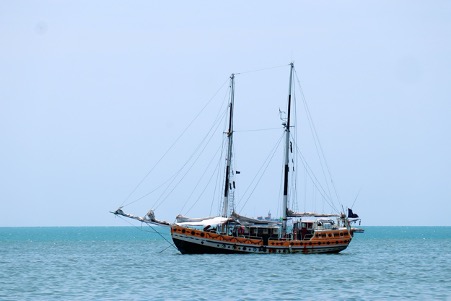
Arka Kinari Berthed in Makassar (Image: Oka Pangestu/the Spice Routes)
“Yesterday I came to visit Sultan Hasanuddin Tomb, located inside the prison of Sultan Diponegoro. There are regrets here, the steps we took in the past as a nation, how we do not come back and let ourselves be trapped in history, how we can move forward. We might have been great earlier, but we also lose or succumb. So, for the future, how can we establish good relationships with the knowledge we have obtained in hundreds of years,” stated this musician who once released the Napak Tilas album.
Nusantara spices and colonialism are two things that are familiar to Indonesians’ memories. To put it simply, besides bringing out blessings, we can believe that the Nusantara spice also gave rise to long-suffering. As a result, the bad memory of the 3.5 centuries of colonialism in Indonesia myth has become a collective memory that is difficult to erase. It lasts, even when a Javanese-Dutch researcher and poet Gertrudes Johan Resink has reconstructed this myth in his book Indonesia’s History Between the Myths: Essay in Legal Historical Theory.
Nova is sure about the two sides of a coin—the good and bad sides of Nusantara Spice Routes. An event that gives us a choice of which point of view we would see. “There are two things we should bring when talking about the Spice Routes, about the bad memory of colonialism and the other thing before it—the royal era when spices strengthened kingdoms, [the relationship] between the Netherlands and Makassar was so strong. For me, we need to leave the bad memory behind, for we have good memories, for the spices acted as the bridge from one kingdom to another, one island to another… What made spices to be sent from one place to another, and what kind of infrastructure, these things are what we need to think. The love of the sea, the way to appreciate other cultures because every time we come to the spice producer islands, we will experience different things, for instance, we have to obey three things in Banda; religion, culture, and women. If you do not respect these three things, they will not sell the spices to you. From here, we can see many aspects as to why the Spice Routes hold significant benefits.”
According to what Nova said, we can see that there are always offers from both sides. Colonialism gave us a precious lesson about resistance against injustice, about the peoples’ position in front of other peoples that they were all born equally. In an essay “Takdir Ekspedisi Compagnie van Verre” [“The Faith of Compagnie van Verre Expedition”] by Lilie Suratminto in National Geographic Indonesia “Merapah Rempah” edition, there was a leading factor that the nationalists at the end of the 19th century used against the colonialism. It was the Dutch’s step to learn the Malay language that was commonly used as a lingua franca and never really introduced their language and culture to the people of the Dutch East Indies.
It also led to the application of the social stratification that placed the Europeans within the first-class (de Europeanen), followed by the Chinese, Indians, Arabs, and Japanese in the second class (Vreemde Oosterlingen), and the locals within the lowest class (Inlandsch Burger). A spark that was continuously nurtured by the people who believed the wrong idea and felt superior to other nations.
Besides tracing the country’s wealth and potentials in the past, there is another thing about Nova and Arka Kinari’s sea explorers that caught my attention—her figure as a sailor woman and the composition of the crews. My childhood memory about the first line of the childhood song by Ibu Soed in 1940 kept ringing, “Nenek moyangku seorang pelaut” [“My ancestor was a sailor”]. Lyrics that triggered me to question why among all the legendary sailors dominated by men, including Christopher Columbus, Ferdinand Magellan, Vasco da Gama, or Ludovico de Varthema, Ibu Soed chose a figure of nenek [an older woman or grandmother] to slightly portray Nusantara maritime power in the past.
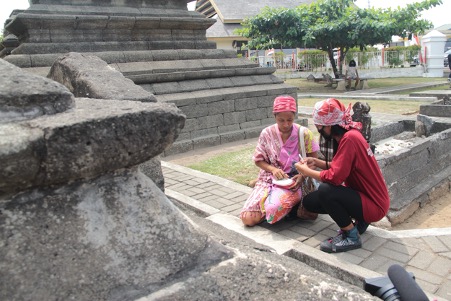
Nova Ruth (right) dan Titi Permata (left) in Sultan Hasanuddin Tomb Complex. (Image: Oka Pangestu/the Spice Routes)
We are very familiar with the saying that women belong to the second caste, a long history that arose since the hunter-gatherer era. They applied particular work classification; for instance, they needed strength and hard work to subdue the game animals. They believed that the position was suitable for men, for they were considered biologically stronger, so women were placed in the position that was considered friendlier for them—domestic affairs, like cooking.
Regrettably, it is believed as human nature, a concept that is far from the truth. In her book Siapa yang Memasak Makan Malam Adam Smith (Marjin Kiri, 2020) [originally published as Who Cooked Adam Smith’s Dinner? (Portobello Books, 2012)], a feminist economist Katrine Marçal boldly wrote a critique and questioned it decisively, “It is only woman who has gender. Man is human. Only one sex exists. The other is a variable, reflection, complementary.” No matter how challenging the domestic role is, eventually, it is considered invaluable in a biased economic idea.
Nova and Arka Kinari crews—that half of the positions are filled by women—are aware of the fact. She is against the stigma that says women who sail are strange. An outdated belief that is believed to be human nature, that, unfortunately, occurs in Indonesia and the whole world.
“A myth about women who cannot be on the ship that is considered to be bad luck does not only occur in Indonesia but also globally, so it is the thing I want to take care of as a woman. Despite gender, everyone has the right to be on the sea. That is the nature of the sea; it is an estuary of various rivers and the characteristics of rivers. They become one in the sea; they are just as salty, just as free. And then, maritime boundaries of countries make it obscure, so there are abundant philosophies about the sea that support women’s freedom of expression. For example, in the middle of the sea, I never think about what to wear to face society’s stigma in different places. So for me, it is essential for women to experience the sea, for you can find your true self on the sea,” stated Nova.
Her figure as the shipowner and the initiator of the voyage triggered many talks, and it makes her happy that female sailor figures are brought back to today’s narration and talk. “The more people talk about it [women who choose to sail], the better, for it leads public opinion about women who sail to be better in describing women, and we [Arka Kinari] are fine here.”
From my brief conversation with Nova and the knowledge I got about Arka Kinari, their story reminded me of the character Keiko and her convenience store in the novel Gadis Minimarket (GPU, 2020) [published in English as Convenience Store Woman (Granta Books, 2018)] by Sakuya Murata. Through Keiko, we are brought to the story of a woman grappling with the stigma and trying hard to be considered normal by society’s standards. Similar to Arka Kinari that makes Nova free as a human, Keiko chooses a convenience store that, for her, seems to be fairer, “I wished I was back in the convenience store where I was valued as a working member of staff and things weren’t as complicated as this. Once we donned our uniforms, we were all equal regardless of gender, age, or nationality—all simply store workers.”
Things that I know about Arka Kinari when they first sailed are not very different from Keiko’s experience when she first worked in the convenience store. For example, training for the new crew, introducing the tools’ functions, doing their jobs effectively, and ensuring everything works well. Also, how Murata in the novel gives criticism to the role of women that is mistakenly believed, “I always did want revenge, on women who are allowed to become parasites just because they’re women.”
If Nova can be associated with Keiko, Arka Kinari, and the sea is the convenience store, a home where Keiko can be a human entirely without minding the outdated stigma that is continuously believed by the majority of people or to borrow Nova’s words, the place where you can find your true self.
Text: Doni Ahmadi
Editor: Tiya S.
Translator: Dhiani Probhosiwi
